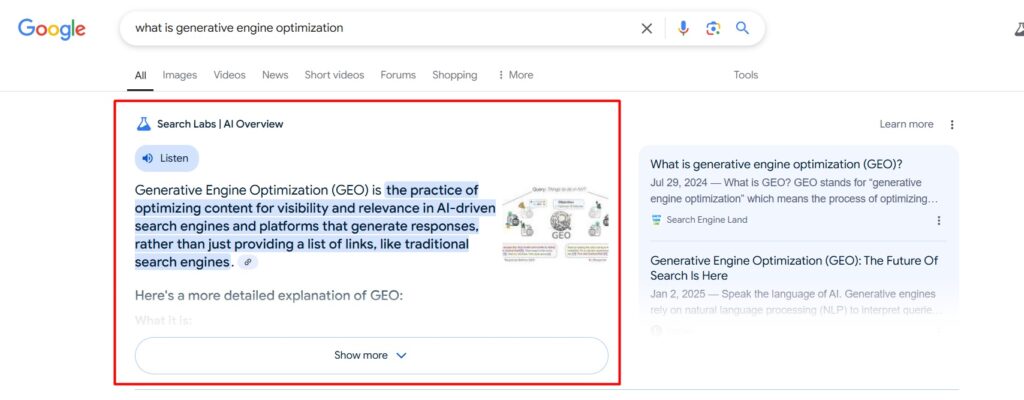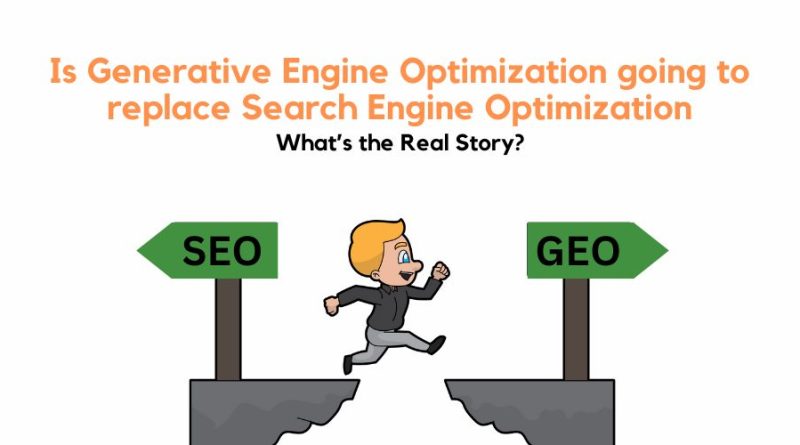Is Generative Engine Optimization (GEO) going to replace Search Engine Optimization (SEO): What’s the Real Story?
With the introduction of AI in Search, a new field is gaining momentum – Generative Engine Optimization (GEO).
GEO is the new process that focuses on optimizing your website content for better visibility on AI-driven search engines, i.e., Google AI Overviews, ChatGPT, or Gemini.
GEO and SEO are similar in various forms yet they differ.
SEO targets traditional search engines, whereas, GEO focuses on AI-driven engines.
If you have been using Google and its new products for some time, you might be familiar with the AI-generated results that come on top of search results.

Many businesses find this change frustrating as they have worked a lot to rank on top searches for different sets of keywords. And most of them think they need to start all over again to be a part of this new search.
Let me burst the bubble – You do not need to re-start but strategize your existing plan.
If you have optimized your website according to SEO guidelines, you have already crossed Level 1.
What is Generative Search?
Generative search is an advanced technique that uses artificial intelligence to overview the entire data (related to your query) available on the Internet, compile, and generate a short yet informative response. This practice produces direct answers to user queries rather than a list of links.
Generative search results are supposed to be more accurate, helpful, and less time-consuming. Unlike SEO, you no longer have to visit different links to get the right solution for your query.
This shift is a bit scary but not impossible. If your content is AI-ready, there is a high chance of getting featured in the top results of the AI summary.
So, the next question most of us would be wondering is “HOW TO DO IT“?
Before I jump to the strategies, one thing you must get clear – GEO is the right method to get AI-ready content.
Proper implementation of GEO principles in your content is the right path to success.
Read More: How Search Engines Work?
Strategies to Effectively Use Generative Search
Adopting GEO best practices can help your website stand out, here’s how:
1. Prioritize Content Structure and Fluency
Optimize your content in such a way that both human readers and robots can easily read and understand. Instead of creating and inserting long statements, try shorter meaningful sentences. Add clear headings and subheadings to your content for better structure. Make use of bullet points and lists to break down your content and improve your readability score.
Organized content makes it easier for readers to understand the concept and available information.
2. Implement E-E-A-T Principles to Your Content
Just like SEO, GEO also acknowledges E-E-A-T Principles and their implementation.
E-E-A-T implies experience, expertise, authoritativeness, and trustworthiness – the four main principles that can rank your piece.
But how?
Experience can be represented by providing case studies that show actual work or skill performed.
Expertise could be included in the content via external links from reliable sources.
Authoritativeness can be incorporated into the content by highlighting awards or recognitions.
Trustworthiness is best when the information is clear, accurate, and free of errors. Instead of stuffing keywords or placing clickbait, try to create information with the customer’s benefits in mind.
3. Human and AI Optimization
Instead of just focusing on human readers, target robots as well.
Keep your tone and language very easy for both humans and AI. This information will make it easier for robots to extract key points and present your data in a generative search.
It can be challenging for content writers but with consistency and improvement, one can achieve the goal fast.
4. Use AI Tool for Creating Content
Most of you would disagree with this point, but try creating the content first via an AI tool.
AI will generate content on your topic by reviewing and compiling data from multiple sources. Thus, making your content informative and well-structured.
You can review the created piece from AI, make changes if needed, do the fact-checking, and refine your content.
I do not recommend relying 100% on the AI content as sometimes it can make things up which can disappoint your user or create false information. Also, it can conflict with E-E-A-T principles.
Hence, re-check the facts, review, and edit before publishing.
Apart from this, learn about the latest AI tips and tricks, apply GEO techniques smartly, and create a healthy balance between SEO and GEO efforts.
AI is making things simple but it is important to keep quality, authoritativeness, and relevancy in mind.
